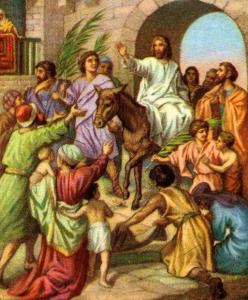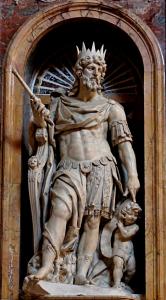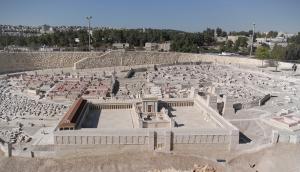(Lectionary for March 25, 2018)

I know, I know! Mark is not in the Hebrew Bible, and I have almost exclusively directed my blog, now in its seventh year, to the First Testament, although I have on occasion addressed myself to the Book of the Acts post-Easter. But today, I am intrigued by Mark’s account of Jesus’ donkey ride into Jerusalem, and its relationships to the Hebrew Bible. See? You just knew I would get to the Hebrew Bible ASAP! What follows is something of a sermon on this text, a homily that I hope you find useful as you think about your own sermon this coming Sunday.
Mark has a very special way of talking about Jesus. Or perhaps better said, he has special interest in what those around Jesus think about him. The long and the short of it is that hardly anyone can quite figure out just who the man is! This is so, because Jesus almost never speaks and acts in ways that his followers, and his antagonists, are ready for. Time and again, what Jesus says and what Jesus does simply bewilders those around him.
To get a flavor of this particular style, let me remind you of four stories that immediately precede Mark’s account of Jesus’ ride into the Holy City. 1) When some people bring Jesus some children to bless, and the disciples are shocked that these little snot-nosed brats are delaying the important work of God, Jesus announces to them that it is in fact children who are signs of the work of God in the world. 2) When a very rich man comes up to Jesus, carrying his riches for all to see as signs of his divine favor, Jesus astoundingly says that his riches are getting in the way of his walk with God, and that he should divest himself of all of them forthwith. The man, clearly horrified at this demand, walks away as fast as his legs will carry him. 3) Jesus’ two closest disciples, James and John then take the occasion of the rich man’s rebuke to ask Jesus for the closest spots of power near him when the kingdom of God comes. Jesus’ reply to this shameless reach for authority is to ask them if they can walk his tragic road of suffering and death, with the clear implication that they cannot, and finally to add that such power as they want is not his to grant anyway. 4) Blind Bartimaeus is then encountered, and though he is told by the disciples to shut his loud trap, he is called by Jesus and is immediately healed of his infirmity and follows Jesus as a result.
In these stories, the demands of faith are made plain, and the demands are not at all easy ones. So, when Jesus mounts his donkey to ride through the Golden Gate of Jerusalem, the expectations for him are decidedly mixed. And that is so, because all those at the gate have few clues about just who he really is. Back at Caesarea Phillipi, Jesus asks his closest followers precisely who they have heard people think he is. Some answer a second John the Baptist, others say Elijah, forerunner of the Messiah of God, and still others say one of the prophets. What about you, asks Jesus? And the leather-lunged Peter shouts out, “You are the Messiah!” “Don’t say anything more about that,” warns Jesus, apparently because he discerns that Peter does not know what he is saying; this Messiah is not what Peter or anybody else expected.
And with all that in our minds, Jesus rides into the city. Jesus has spent his whole ministry on foot, but now Mark says he rides. The very fact that he is riding a donkey demonstrates clearly that he appears to be a king, since in the Hebrew Bible kings regularly rode on special donkeys to their coronations, as Solomon’s ride makes clear in 2 Samuel. But this is no king we have ever seen. Listen to what the excited crowd says. First, they shout “Hosanna,” an Aramaic demand that this Jesus, or at least the God he represents, should save them now. Save them from what? Save them for what? All remains mysterious here. They then cry, “Blessed is the one who comes in the name of the Lord,” quoting the Greek version of Ps.118:26. This suggests that their demand to be saved is directly connected to the donkey rider, but it remains unclear what this saving should consist of.
Then they shout something very odd. “Blessed is the coming kingdom of our father David!”  Never in the Hebrew Bible is it suggested that David’s kingdom is coming, nor is it ever said that David is some sort of father. Israel long hoped for a new Davidic kingdom of power and greatness, but it was hardly certain that it was coming any time soon. The crowd concludes its cries with the peculiar shout, “Hosanna in the highest heaven!” Are they now demanding that their salvation, whatever that may mean, is rooted in the heavens with God? I would suggest that the confusion of these statements about and around Jesus is Mark’s way of saying that the crowd does now know what it wants, in fact, and has few ideas about how this Jesus is going to satisfy their odd demands. Here again we see, through the eyes of mark, just how nonplussed those around this Jesus are; they are fully unaware of who he is and what he has come to do.
Never in the Hebrew Bible is it suggested that David’s kingdom is coming, nor is it ever said that David is some sort of father. Israel long hoped for a new Davidic kingdom of power and greatness, but it was hardly certain that it was coming any time soon. The crowd concludes its cries with the peculiar shout, “Hosanna in the highest heaven!” Are they now demanding that their salvation, whatever that may mean, is rooted in the heavens with God? I would suggest that the confusion of these statements about and around Jesus is Mark’s way of saying that the crowd does now know what it wants, in fact, and has few ideas about how this Jesus is going to satisfy their odd demands. Here again we see, through the eyes of mark, just how nonplussed those around this Jesus are; they are fully unaware of who he is and what he has come to do.
And Jesus himself adds to their confusion by his subsequent trip to the temple of Jerusalem. Rather than immediately attack the vendors and sacrificial animal sellers in the outer courtyards of the temple complex, as Jesus is said to do in the gospels of Matthew and Luke, Jesus merely “looked around at everything” and left for Bethany with the twelve. What a complete anticlimax! Jesus seems to pick up an ancient Fodor’s guide, observes in silence the famous and impressive Herodian temple, and leaves for a night of rest with his friends. Once again, the teacher has led us in a direction we did not imagine he would go. Once again, Mark warns us that our expectations and demands of Jesus may be mistaken. This mysterious monarch may not be who we think he is, may not finally be who we want him to be.
In our own time, Jesus has too often become a tool of the powerful, affirming those in control, excluding those who would think differently, those who would find others not outsiders but friends. So, listen carefully as the donkey once more clip-clops his way into the city. Now, remember what he said to his followers about just who could be his disciples: “Deny yourself, take up your cross, and follow.” That is the way to follow this peculiar king. That is the way to join him as he rides his donkey into the rule and realm of God.
(Images from Wikimedia Commons)











